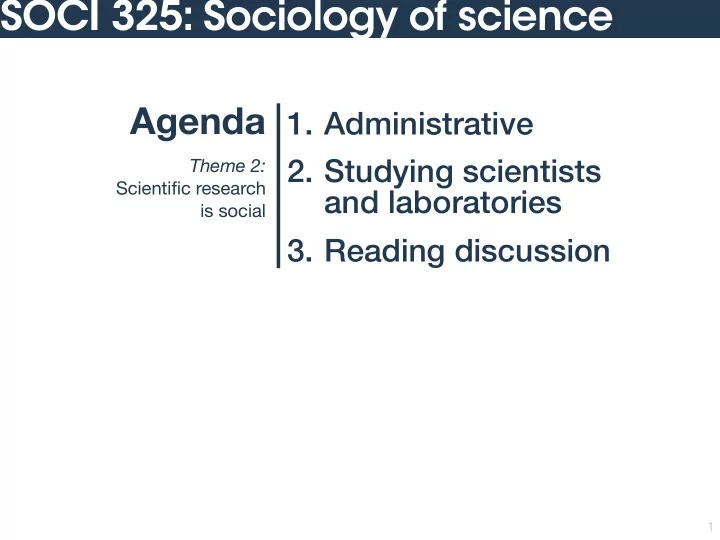

SOCI 325: Sociology of science Agenda 1. Administrative 2. Studying scientists Theme 2: Scientific research and laboratories is social 3. Reading discussion 1
Administrative Notes & Perusall scoring feedback ⦙ Check your scores on Perusall 1 point = full credit ⦙ No exact threshold for full credit, but 7–15 annotations is a good, rough target: https://soci325.netlify.com/perusall.html General discussion ⦙ Try to respond to (almost) all of the questions. It is harder to get full credit with only a few responses. ⦙ Avoid terse, bullet-point style. Use full sentences and fully describe your your ideas. ⦙ Refer directly to the text. Use quotes and page numbers (if possible), and refer to the structure of the argument. 2
Studying scientists & laboratories 3
Studying scientists & laboratories Individuals in context Individuals’ traits matter ⦙ Scientists’ personalities, goals, history, ego, and ideology alter scientific practice. ⦙ The questions one asks, the methods one uses, and the answers one comes up with are influenced by individual traits The way one is seen matters ⦙ The respect of colleagues, the power Rosalind Franklin, pioneer in the discovery of the structure of DNA, did not receive of certain positions, gendered credit in her lifetime. expectations, and ‘star’ power Photo by MRC Laboratory of Molecular Biology (CC BY-SA 4.0) change the course of science. ⦙ Who gets credit; who is forgotten? 4
Studying scientists & laboratories Findings are negotiated Methods and techniques are not clean-cut ⦙ Creating images, making and tuning equipment, refining techniques, … ⦙ Scientist must learn to, e.g. make visualizations for publication. Figure 1b from retracted article: Skills are embedded in people Obokata, Haruko, Teruhiko Wakayama, Yoshiki Sasai, Koji Kojima, Martin P . Vacanti, Hitoshi Niwa, Masayuki Yamato, ⦙ Scientists have skills, honing certain and Charles A. Vacanti. 2014. “Stimulus- techniques. Triggered Fate Conversion of Somatic Cells into Pluripotency.” Nature 505 (7485) (January): 641–647. ⦙ They may keep methods secret to maintain a competitive edge. 5
Studying scientists & laboratories Findings are negotiated Data are messy ⦙ Data rarely tell a clear story ⦙ Scientists must construct a narrative to to turn data into a finding Interaction Experimental data in quantum mechanics ⦙ Narrative is often resolved through supports many competing interpretations interaction of multiple scientists. (e.g. the “Copenhagen” and “many- worlds” interpretations). ⦙ Di ff erent members of the same lab, or di ff erent research groups, may advocate for competing interpretations 6
Studying scientists & laboratories Communication Journals ⦙ Prestige of publication venue influences impact of findings. ⦙ High-profile journals have incentive to make a ‘splash’. Scooping ⦙ Credit within scientific institutions awarded to first recognized finding. ⦙ Scientists feel push to finalize research quickly. August 2016 issue of Nature. Broadly: incentive to hide messiness of scientific process 7
Discussion 8
Discussion Small-group discussions: ⦙ If you are not in a group, try to find one with less than 5 before forming a new group ⦙ Choose a new facilitator who will keep the discussion focussed and make sure everyone is able to participate. ⦙ Choose a new secretary who will take notes and summarize the group’s responses for submission. ⦙ Download today’s discussion questions (Microsoft Word format) from the link on the syllabus. You can type your answers directly in the document to upload to MyCourses. https://soci325.netlify.com/discussion_questions/02.01.docx Notes (again): ⦙ Try to respond to (almost) all of the questions. ⦙ Avoid terse, bullet-point style. ⦙ Refer directly to the text. 9
Next class Theme 3: Science and power Required reading: • Gould (1981) Measuring Heads 10
Recommend
More recommend